Related Research Articles

Laurence Kerr Olivier, Baron Olivier, was an English actor and director who, along with his contemporaries Ralph Richardson and John Gielgud, was one of a trio of male actors who dominated the British stage of the mid-20th century. He also worked in films throughout his career, playing more than fifty cinema roles. Late in his career, he had considerable success in television roles.

Sir Ralph David Richardson was an English actor who, with John Gielgud and Laurence Olivier, was one of the trinity of male actors who dominated the British stage for much of the 20th century. He worked in films throughout most of his career, and played more than sixty cinema roles. From an artistic but not theatrical background, Richardson had no thought of a stage career until a production of Hamlet in Brighton inspired him to become an actor. He learned his craft in the 1920s with a touring company and later the Birmingham Repertory Theatre. In 1931 he joined the Old Vic, playing mostly Shakespearean roles. He led the company the following season, succeeding Gielgud, who had taught him much about stage technique. After he left the company, a series of leading roles took him to stardom in the West End and on Broadway.

Sir Arthur John Gielgud, OM, CH was an English actor and theatre director whose career spanned eight decades. With Ralph Richardson and Laurence Olivier, he was one of the trinity of actors who dominated the British stage for much of the 20th century. A member of the Terry family theatrical dynasty, he gained his first paid acting work as a junior member of his cousin Phyllis Neilson-Terry's company in 1922. After studying at the Royal Academy of Dramatic Art he worked in repertory theatre and in the West End before establishing himself at the Old Vic as an exponent of Shakespeare in 1929–31.

Dame Edith Mary Evans, was an English actress. She was best known for her work on the stage, but also appeared in films at the beginning and towards the end of her career. Between 1964 and 1968, she was nominated for three Academy Awards.

Dame Edith Margaret Emily Ashcroft, was an English actress whose career spanned more than 60 years.

The Theatre Royal Haymarket is a West End theatre on Haymarket in the City of Westminster which dates back to 1720, making it the third-oldest London playhouse still in use. Samuel Foote acquired the lease in 1747, and in 1766 he gained a royal patent to play legitimate drama in the summer months. The original building was a little further north in the same street. It has been at its current location since 1821, when it was redesigned by John Nash. It is a Grade I listed building, with a seating capacity of 888. The freehold of the theatre is owned by the Crown Estate.

Robert Flemyng, OBE, MC was a British actor. The son of a doctor, and originally intended for a medical career, Flemyng learned his stagecraft in provincial repertory theatre. In 1935 he appeared in a leading role in the West End, and the following year had his first major success, in Terence Rattigan's comedy French Without Tears. Between then and the Second World War he appeared in London and New York in a succession of comedies.

Dame Madge Kendal, was an English actress of the Victorian and Edwardian eras, best known for her roles in Shakespeare and English comedies. Together with her husband, W. H. Kendal , she became an important theatre manager.

Adele Dixon was an English actress and singer. She sang at the start of regular broadcasts of the BBC Television Service on 2 November 1936.

Edward Knoblock was a playwright and novelist, originally American and later a naturalised British citizen. He wrote numerous plays, often at the rate of two or three a year, of which the most successful were Kismet (1911) and Milestones. Many of his plays were collaborations, with, among others, Vicki Baum, Beverley Nichols, J. B. Priestley and Vita Sackville-West.

The Good Companions is a novel by the English author J. B. Priestley.
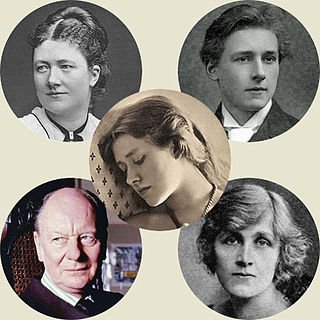
The Terry family was a British theatrical dynasty of the late 19th century and beyond. The family includes not only those members with the surname Terry, but also Neilsons, Craigs and Gielguds, to whom the Terrys were linked by marriage or blood ties.
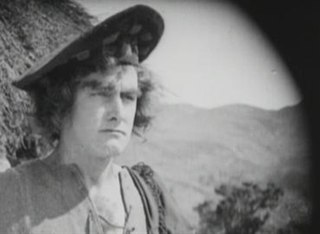
David Hawthorne was a British stage and film actor. He played the leading man in a number of films during the silent era, but later switched to character roles. One of his more notable roles was that of Rob Roy MacGregor in the 1922 film Rob Roy.
Summer Day's Dream is a 1949 play by J. B. Priestley. It is set in 1975, and evokes a world where a nuclear Third World War has caused Britain to revert to a pre-industrial, pre-capitalist state. It takes its title from Shakespeare's A Midsummer Night's Dream, which is being produced by two members of the English family the play is based around.
The Calendar is a 1929 play by the British writer Edgar Wallace. It is a crime thriller set in the world of horse racing world, the sport being among Wallace's interests. The protagonist is a financially struggling racehorse owner with a shady reputation. It premiered at the Palace Theatre in Manchester before transferring to Wyndham's Theatre in the West End.
The Outsider is a play by the British writer Dorothy Brandon. It portrays the struggle of an unorthodox medical practitioner to gain acceptance by the medical establishment. It was subsequently revised to show the unconventional triumphing over the conventional, whereas the play had originally had the opposite ending.
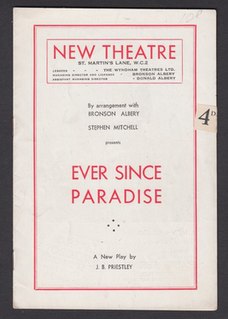
Ever Since Paradise is a 1946 comedy play by the British writer J.B. Priestley.
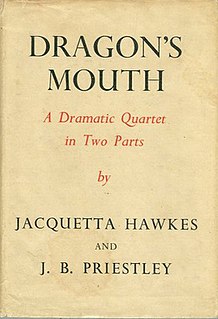
Dragon's Mouth is a 1952 play by J.B. Priestley and his wife Jacquetta Hawkes. It features four characters on a yacht trapped in quarantine off the West Indies, discussing life.

The White Countess is a 1954 play by J.B. Priestley and his wife Jacquetta Hawkes.
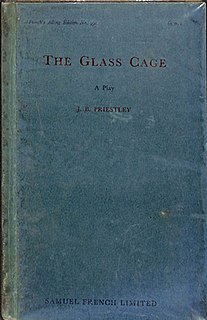
The Glass Cage is a 1957 play by J.B. Priestley.